#ancestry
Text
In which I try not to be That Guy TM when it comes to Irish ancestors: An exploration of ancestry, diaspora and culture
Because of The Horrors TM in my life atm I've been looking into my biological family tree. I'm adopted but estranged from my adoptive family and I never met my biological family since I was adopted just short of my 2nd birthday. I've been tracing my ancestry for about 3 years now and it's genuinely quite stress relieving to me. It's also fun and challenging from a research standpoint - putting together my own family tree gave me the skills to write articles like this one I wrote in 2022 about historical Welsh queer people, for example.
Lately, I've been finding out more about my Irish ancestors while an adoptee (and thus not knowing any of my biological family) - but also doing this as a Celticist and tired of people doing the 'my sister's friend's cousin's father's mother was Irish' thing. This has created an almost unbearable tension between curiosity at my own ancestry while trying not to be That Guy who finds out about one (1) Irish ancestor hundreds of years ago and is weird about it.
Especially since mine are quite distant ancestors - my great, great, great grandparents were born in Dublin and in a tiny village in County Down called Dunnaman (near Kilkeel). However, they were Irish Catholics and emigrated to Liverpool in the 1870s - all of their subsequent children and grandchildren were born in Liverpool and all of the above + great grandchildren were raised Catholic - including my grandmother (who died before I was born). So there was an obvious attempt to maintain that heritage. There's even evidence my great, great, great grandmother at least spoke Irish (which, as she was born in County Down, would have been Ulster Irish).
The problems with uncritically throwing oneself at an ancestor's nationality:
Now, not all North Americans of Irish (or Welsh, Scottish, Italian, Scandinavian, German etc.) descent do this - but there's a very vocal set of North Americans of Irish descent who find awe and interest in their ancestry - which is actually quite a positive thing! - however, due to either temporal or cultural disconnect, they may end up doing or saying things (and not necessarily with bad intentions) which can have a negative impact on the Irish and the Irish language (or [nationality] and [language(s) associated with that nationality].
I'm reminded of the time an American commented on a Welsh language rights post I made in support of Welsh speakers, but they accidentally ended up using a white nationalist slogan by mistake. It can be a minefield - and with regards to Ireland specifically, mistakes like that can be so much worse. To literally give my own (mild) example, today I decided to relearn Irish (since I haven't spoken any in years since being taught basics at undergrad) and picked up a blank notebook I bought at Tesco the other week, while completely forgetting the inside cover of the notebook was orange. I was planning on decorating the notebook anyway and painted it a different colour. While I know that nobody would really hold it against me if I didn't change the colour, I just know that walking around with an orange notebook filled with Irish I'm relearning because of interest in my Catholic ancestors could be a confusing set of messages, at the very least. If you don't understand why this is, look up the meanings of the colours on the flag of Ireland.
Which is to say, even those of us in Northern Europe who have significantly greater physical proximity to Ireland than North America (and therefore should know better) still can and do get things wrong. And not just benignly wrong like in my case.
The tendency for some North Americans of Irish descent (Canada isn't exempt from this) to conflate Irish ancestry with a contemporary connection to the modern countries located on the island of Ireland as a whole can have results ranging from 'a bit weird' to 'jesus fucking christ'. As a Celticist, I've seen far, far too many Americans of Irish descent try to weigh in on modern Irish politics without any background knowledge or tact at all - and naturally they stake their claim on modern Irish politics entirely on the premise of having distant Irish ancestors. Or, even worse, things start to get all phrenological.
'Irish blood' and the nonexistence thereof:
'Irish blood' is continually evoked by some to validate their sense of 'Irishness' and the obsession with '[insert nationality] blood' is a distinctly North American phenomenon- likely related to or an offshoot of the concept of 'blood quantum', in which enrolment into some Native American nations and tribes is determined by how much 'Native blood' a person has. Notably, many people who would ostensibly have been described under this system as 'full blood' were registered by the US as 'half blood'. This is a method of genocide intended to wipe out tribes and nations by imposing strict measures of who does or does not qualify to enrol into a tribe or nation. This concept seems to have been extrapolated over time (in a North American context at least) into the idea of descent from other nationalities' being measured in a similar or adjacent way. This is how you end up with some North Americans declaring they are '1/8 Italian and 1/4 Irish' on their dad's side etc. While in Europe (where these nationalities hail from, crucially) this practice is seen as a really weird way to describe your ancestry. In general, it's simply 'my 4 times grandfather came from Spain' or 'my great great grandfather on my dad's side came from Finland' etc. if it comes up at all. For various political reasons, many Europeans with descent from multiple other European nationalities may choose to omit to mention descent from certain nationalities, especially if in recent history there has been conflict between their birth nation and an ancestor's nation. The most famous example of this is literally the British royal family changing their surname from the German Saxe-Coburg and Gotha to the more 'British sounding' Windsor in 1917 due to the onset of the First World War.
Where it gets really weird (and also very offensive and rude) is when cultural stereotypes get invoked alongside the whole 'blood' thing in usually quite damaging and/or disparaging ways. I've seen way too many North Americans of Irish descent claim they're alcoholics because they have 'Irish blood' or even worse, claim it's normal to domestically abuse their spouses because of it!! (Genuine thing I have seen btw). Same goes for claiming to be a naturally good chef because of 'Italian blood' and so on. As a general rule, people from the place where your ancestors were from don't generally like to be inherently be considered drunks or prone to violence due to their nationality. Or have weird and inaccurate idealisms projected onto their language or cuisine.
Aren't there any positives?
It wouldn't be fair to make a post like this without mentioning some of the positives that can come from interest in an Irish ancestor. Like I mentioned at the start of this post, I myself felt inspired to relearn Irish because of my own Irish ancestors. I was taught the Connacht dialect at undergrad, however, since my ancestor was from County Down, I'm going to try and learn Ulster Irish instead. One doesn't need Irish ancestors to learn Irish of course - when I learned I wasn't aware I had any Irish ancestors. But being inspired to learn Irish because of an ancestor can't hurt and directly increases the number of Irish speakers in the world (provided you keep at it). This is a net positive for the language as a whole.
Similarly, people who have educated themselves on Irish politics because of their ancestry and genuinely learned something are also a positive thing to come out of discovering Irish ancestors. In my experience, these people are the kind of people I enjoy talking to about being a Celticist because they actively want to learn and respect the cultures being talked about. Which is huge to me!
Conclusion:
As a Welsh speaker whose national identity is more-or-less Jan Morris-esque, my Irish ancestry is an interesting facet of my ancestry I simply didn't know about before. And being an adopted person, I can sympathise with the general sentiment of a lot of white North Americans of feeling disconnected or alienated from any ancestral heritage. The conditions which create That Guy TM as described above rely on that sense of alienation to propagate a very ineffective, tactless and often very insensitive approach to Irish and other European cultures. But the important thing is that that approach can be challenged by people genuinely interested in their ancestry who are also conscientious of the living versions of the cultures their ancestors hailed from.
For me, that means learning Irish in a dialect my ancestors are likely to have spoken. I also visited the library today to check out some books on the Irish emigration to England and the sociopolitical reasons behind that emigration. I know the broad strokes, but the details are desirable to know to get a better idea of the why and how the country of my birth had a hand in creating the conditions which led my ancestors to emigrate in the first place. I think the world would be a better place if people took the time to understand the history and politics of ancestors which don't share their nationality.
As always, reblogs and thoughts are welcomed and encouraged!
Thank you for reading to the end - and if you'd like to support me, please see my pinned post. Diolch!
#long post#Ireland#Irish#Gaelige#Celtic Studies#Celticist#Irish diaspora#Irish americans#blood quantum cw#racism cw#(just in case)#ancestry#geneology#family history#I've probably made typos but it's 11:40pm and I need to go to sleep
34 notes
·
View notes
Text
Ashkenazi Jews are a Jewish ethnic group who have their earliest ancestors from the indigenous tribes of Israel…at least on one side of the family tree. A study published in 2013 in Nature Communications has shown their maternal lineage comes from a different, and possibly unexpected, source.
26 notes
·
View notes
Text
We ask your questions so you don’t have to! Submit your questions to have them posted anonymously as polls.
#ancestry#heritage#family history#genealogy#polls#incognito polls#anonymous#tumblr polls#questions#tumblr users#polls about the world
9K notes
·
View notes
Text
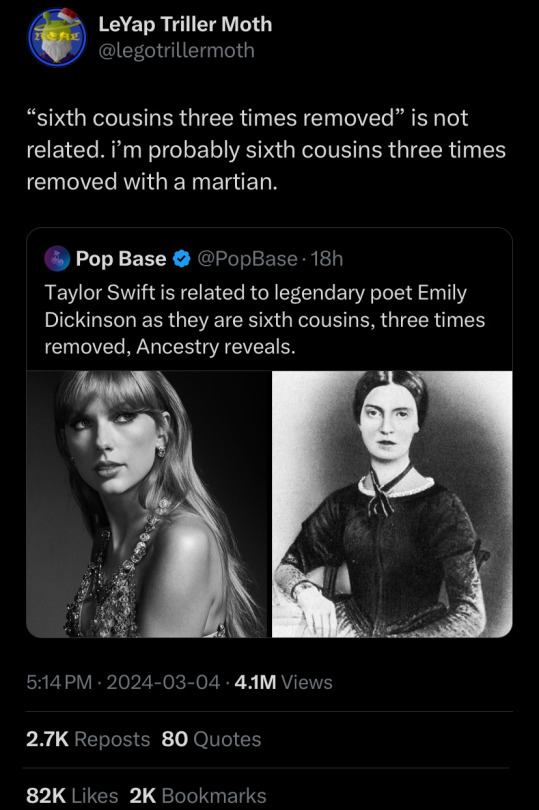
2K notes
·
View notes
Text
Ancestor work can include pets btw
I never knew a lot of my deceased family, and the ones I did know I didn't know well. I loved my great grandmother, but in reality I didn't know her well, I still honor her and my grandpa who died when I was 3, but I'd be lying if I said I wasn't closer to my cats.
My cats were with me my whole life, and theirs, they're my children. I soothe them to sleep by cradling them when they're scared, I sing to them and they sing back, I sleep with them every night. They are my whole world, and I'd do anything for them.
So of course they're honored after death like a blood family member, of course I leave them offerings and speak to them beyond the grave, of course there is space for them on my altars.
Don't let anyone tell you pets deserve less honor than humans in your practice.

470 notes
·
View notes
Text
Getting a job at the shady discover-your-ancestry DNA testing outfit and doctoring everybody's results to tell them they're 50% pine tree.
2K notes
·
View notes
Text
First, let’s address the fact that hackers recently accessed the personal data of about 14,000 23andMe customers. Because of how 23andMe works—it has a “DNA Relatives” feature that lets users find people they are probably related to—this breach created 6.9 million “other users” who had data stolen in the breach, according to reporting by TechCrunch. This data included people’s names, birth year, relationships, percentage of DNA shared with other 23andMe users, and ancestry reports.
[...]
Getting your DNA or your loved ones’ DNA sequenced means you are potentially putting people who are related to those people at risk in ways that are easily predictable, but also in ways we cannot yet predict because these databases are still relatively new. I am writing this article right now because of the hack, but my stance on this issue has been the same for years, for reasons outside of the hack.
In 2016, I moderated a panel at SXSW called “Is Your Biological Data Safe?,” which was broadly about the privacy implications of companies and other entities creating gigantic databases of people’s genetic code. This panel’s experts included a 23andMe executive as well as an FBI field agent. Everyone on the panel and everyone in the industry agrees that genetic information is potentially very sensitive, and the use of DNA to solve crimes is obviously well established.
At the time, many of the possible dangers of providing your genome to a DNA sequencing company were hypothetical. Since then, many of the hypothetical issues we discussed have become a reality in one way or another. For example, on that panel, we discussed the work of an artist who was turning lost strands of hair, wads of chewing gum, and other found DNA into visual genetic “portraits” of people. Last year, the Edmonton Police Service, using a company called Parabon, used a similar process to create 3D images of crime suspects using DNA from the case. The police had no idea if the portrait they generated actually looked like the suspect they wanted, and the practice is incredibly concerning.
To its credit, 23andMe itself has steadfastly resisted law enforcement requests for information, but other large databases of genetic information have been used to solve crimes. Both 23andMe and Ancestry are regularly the recipients of law enforcement requests for data, meaning police do see these companies as potentially valuable data mines.
749 notes
·
View notes
Photo
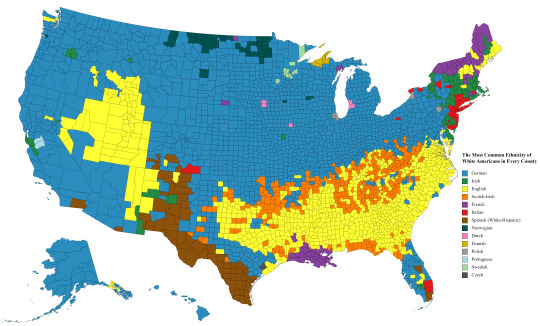
The Most Common Ethnicity of White Americans in Every County
934 notes
·
View notes
Text
"My name is not my own, it is borrowed from my ancestors. I must return it unstained. My honor is not my own, it is borrowed from my descendants, I must give it to them unbroken. Our blood is not our own, it is a gift to generations yet unborn. We should carry it with responsibility."
Vincent Enlund
4th house, 8th house, & 12th house
479 notes
·
View notes
Text
Your body is an ancestor. Your body is an altar to your ancestors. Every one of your cells holds an ancient and anarchic love story. Around 2.7 billion years ago free-living prokaryotes melted into one another to form the mitochondria and organelles of the cells that build our bodies today. All you need to do to honor your ancestors is to roll up like a pill bug, into the innate shape of safety: the fetal position. The curl of your body, then, is an altar not just to the womb that grew you, but to the retroviruses that, 200 million years ago taught mammals how to develop the protein syncytin that creates the synctrophoblast layer of the placenta. Breathe in, slowly, knowing that your breath loops you into the biome of your ecosystem. Every seven to ten years your cells will have turned over, rearticulated by your inhales and exhales, your appetites and proclivity for certain flavors. If you live in a valley, chances are the ancient glacial moraine, the fossils crushed underfoot, the spores from grandmotherly honey fungi, have all entered into and rebuilt the very molecular make up of your bones, your lungs, and even your eyes. Even your lungfuls of exhaust churn you into an ancestor altar for Mesozoic ferns pressurized into the fossil fuels. You are threaded through with fossils. Your microbiome is an ode to bacterial legacies you would not be able to trace with birth certificates and blood lineages. You are the ongoing-ness of the dead. The alembic where they are given breath again. Every decision, every idea, every poem you breathe and live is a resurrection of elements that date back to the birth of this universe itself.
Today I realize that due to the miracle of metabolic recycling, it is even possible that my body, somehow, holds the cells of my great-great grandmother. Or your great-great grandmother. Or that I am built from carbon that once intimately orchestrated the flight of a hummingbird or a pterodactyl. Your body is an ecosystem of ancestors. An outcome born not of a single human thread, but a web of relations that ripples outwards into the intimate ocean of deep time.
Your Body is an Ancestor, Sophie Strand
#text#Your Body is an Ancestor#Sophie Strand#embodiment#ancestry#animism#ecology#relatedness#kinship
5K notes
·
View notes
Text
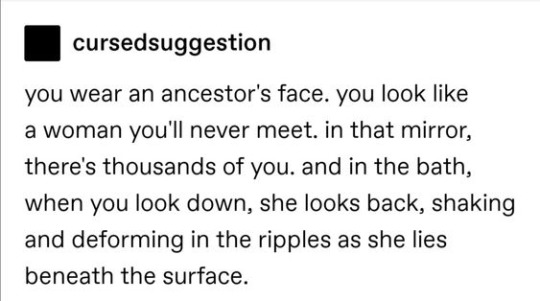
#this post haunts me to this day#in a good way#poetry#womanhood#words#writeblr#quotes#writing#ancestry
199 notes
·
View notes
Text
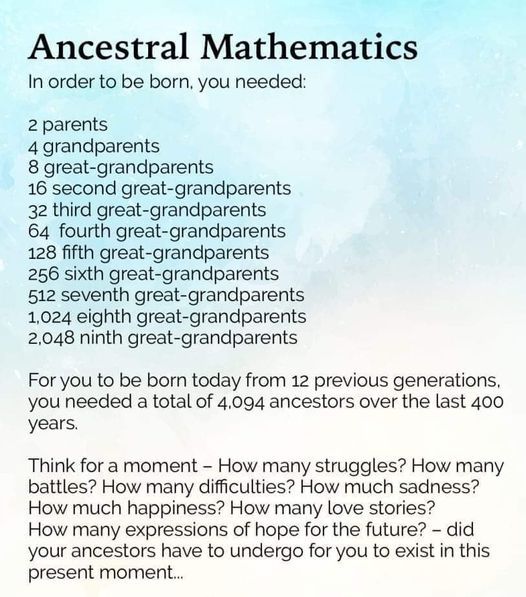
207 notes
·
View notes
Text
I’ve heard some people saying you can’t or shouldn’t work with your ancestors if you’re white. I think this is an exaggeration of what is actually reasonable. Use discernment! Not all your ancestors were bad people. Perhaps most are. But you DONT have to work with those rotten ones (Nazis, sexists, homophobes, abusive assholes, slave owners). The truth is, not everyone in history was evil like that. Did your white ancestors benefit from white privilege? ABSOLUTELY. So do ALL white people, even the ones who don’t like or subscribe to racism. Even current living ones. The misconception with ancestor work is that you have to apparently “like everything about them and treat them like a flawless deity”. Which is so SO wrong. You should treat your ancestors like you’d treat your living family and friends! If your friend started calling someone homophobic or racist slurs would you continue to take their advice and hang out with them? NO. So, ultimately what I’m saying is that discernment is key. My white great grandmother was an amazing woman. She wasn’t perfect, but she was beautiful and strong of heart. She was a bold and flamboyant woman, and was an advocate for women expressing their sexuality and pursuing their dreams at a time when that was absolutely frowned upon. She made mistakes, but she grew from them. I had the honor of having her in my earlier years of life. And she didn’t discriminate against the lgbtq community, in fact was friends with a lot of gays because they were working in the same industry as her (dancing, modeling, art, etc). I love her and I love working with her. I honor the right things she did, and I learn from the problematic decisions she made and regrets. So yeah, don’t discount your ancestors just cause they’re white. There’s a good chance they‘lol be racist. But there’s an off chance that instead they’d actually genuinely ok people who you can learn from their experiences. I hope this post doesn’t come off wrong. I’m not saying honor racists and homophobes. I’m saying don’t throw out the nice babies with the yucky bath water.
Reblog with polite corrections or perspectives if you find this wrong or dumb in anyway! I’d love feedback and am willing to hear others perspectives!
#witchblr#witchcraft#witch#spirituality#witchy#ancestors#ancestral#ancestor veneration#ancestry#ancestor work
381 notes
·
View notes
Text
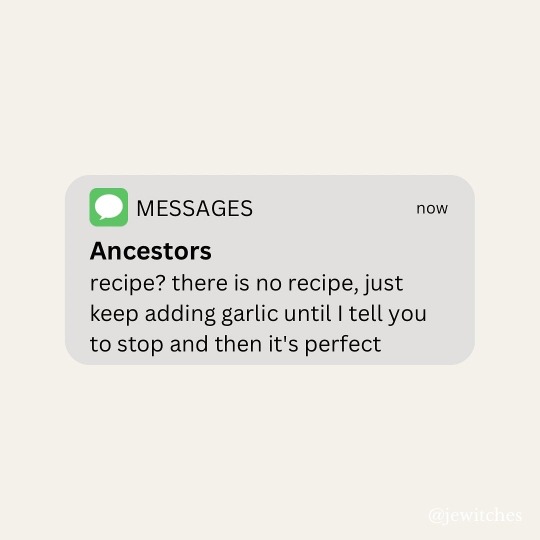
Message from your Ancestors:
Recipe? There is no recipe, just keep adding garlic until I tell you to stop and then it’s perfect
#Jewish#Judaism#Jew#jumblr#jewitches#jewitch#jewish magic#witchcraft#witchblr#witchy#magic#ashkenazi#herbs#garlic#I love garlic#ancestors#ancestry
657 notes
·
View notes
Text
Friendly reminder to witches and pagans who want to incorporate ancestral beliefs into their practice: be mindful that a lot of modern nations and their current dominant culture are relatively new, and even the concept of a national identity is very, very modern. Modern borders may not necessarily reflect the world your ancestors lived in.
For example: immigration documents record my great-great-great grandparents immigrating from Germany in the 1870s. But my ancestors weren't German -- they were Bavarian. They were both born in the country of Bavaria and fled to the USA after the unification of the German Reich (no, not that one). They wouldn't have spoken German as a first language -- they would have spoken Bavarian. And if I wanted to incorporate their culture into my practice, I would need to narrow my search to Bavarian folk practices. Other regional practices from other parts of modern Germany wouldn't have been relevant to my ancestors.
There's a similar situation with another great-great-great grandfather, who immigrated in the 1850s iirc. He was from Lombardy, near Milan, and was fleeing the unification of the Kingdom of Italy. He probably very much did not identify as Italian.
And on the other side of my family we have a Northern English line we've been able to trace back to the 1100s, and those ancestors from the Middle Ages probably identified as Northumbrian rather than as English. My "Scottish" ancestry probably actually comes from that same line, because Northumbria was a border state between England and Scotland.
Modern resources like Ancestry.com and other genealogy sites will use modern country names and borders, which can sometimes give us false understandings of where our ancestors actually came from. This is why it's important to do your own research and fact-check outside the ancestry documents.
#and of course ancestral links arent required for pagan practice#but if you want to#this is my advice#ancestor work#ancestor worship#ancestors#ancestry#genealogy#history#european history#mine#witch#pagan#witchblr#paganism#paganblr
378 notes
·
View notes
Text
Non-paywall version here.
"When Arley Gill, head of Grenada’s National Reparations Committee, envisioned his work seeking repair for centuries of enslavement on the Caribbean island, one thing was certain: It was going to be a long slog.
But just two years since its founding, the task force is fielding calls from individuals around the world looking to make amends for ancestors who benefited from enslavement in Grenada.
“If you had told us this would be happening, we wouldn’t have believed you,” Mr. Gill says, crediting a burgeoning movement of descendants of enslavers getting wise to their family’s history and taking action.
In Grenada’s case, the momentum began with a public apology made by former BBC journalist Laura Trevelyan and her family in February at a ceremony on the island. They apologized for their forebears’ enslavement of people in Grenada and their enrichment from it, pledging an initial contribution of £100,000 ($130,000) toward education on the island.
“She opened the doors for people to feel comfortable” coming forward, says Mr. Gill.
In April [2023], Ms. Trevelyan and journalist Alex Renton co-founded an organization called Heirs of Slavery. Its eight British members have ancestors who benefited financially from slavery in various ways...
Heirs of Slavery says wealth and privilege trickle down through generations, and that there are possibly millions of Britons whose lives were touched by money generated from enslavement.
The group aims to amplify the voices of those already calling for reparations, like Caribbean governments. And it supports organizations working to tackle the modern-day consequences of slavery, both in the United Kingdom and abroad, from racism to health care inequities. But it’s also setting an example for others, drafting a road map of reparative justice for enslavement – at the individual level...
“Shining a light is always a good idea,” says Mr. Renton, who published a book in 2021 about his family’s ties to slavery, donating the proceeds to a handful of nongovernmental organizations in the Caribbean and England. “You don’t have to feel guilt about it; you can’t change the past,” he says, paraphrasing Sir Geoff Palmer, a Scottish Jamaican scholar. “But we should feel ashamed that up to this point we’ve done nothing about the consequences” of slavery.
Start anywhere
Most Africans trafficked to the Americas and Caribbean during the trans-Atlantic slave trade ended up in the West Indies. The wealth generated there through unpaid, brutal, forced labor funded much of Europe’s Industrial Revolution and bolstered churches, banks, and educational institutions. When slavery was abolished in British territories in 1833, the government took out a loan to compensate enslavers for their lost “property.” The government only finished paying off that debt in 2015.
The family of David Lascelles, the 8th Earl of Harewood, for example, received more than £26,000 from the British government after abolition in compensation for nearly 1,300 lives, while “the enslaved people were given nothing,” Mr. Lascelles says. He joined Heirs of Slavery upon its founding, eager to collaborate with peers doing work he’s been focused on for decades.
“People like us have, historically, kept quiet about what our ancestors did. We believe the time has come to face up to what happened, to acknowledge the ongoing repercussions of this human tragedy, and support the existing movements to discuss repair and reconciliation,” reads the group’s webpage.
For Ms. Trevelyan, that meant a very public apology – and resigning from journalism to dedicate herself to activism...
For Mr. Lascelles, a second cousin of King Charles, making repairs included in 2014 handing over digitized copies of slavery-related documents discovered in the basement of the Downton Abbey-esque Harewood House to the National Archives in Barbados, where much of his family’s wealth originated during enslavement.
“What can we do that is actually useful and wanted – not to solve our own conscience?” he says he asks himself...
“Listen and learn”
...The group is planning a conference this fall that will bring together families that benefited from the trans-Atlantic slave trade along with representatives from Caribbean governments and Black Europeans advocating for reparations. In the meantime, members are meeting with local advocacy groups to better understand what they want – and how Heirs of Slavery might assist.
At a recent meeting, “there was one man who said he wanted to hear what we had to say, but said he saw us as a distraction. And I understand that,” says Mr. Renton. “Maximum humility is necessary on our part. We are here to listen and learn, not try to take the lead and be the boss.”
Mr. Renton’s family has made donations to youth development and educational organizations, but he doesn’t see it as compensation. “I see this as work of repair. If I sold everything I own, I couldn’t begin to compensate for the lives my ancestors destroyed,” he says."
-via The Christian Science Monitor, August 1, 2023
Note: I know the source name probably inspires skepticism for a lot of people (fairly), but they're actually considered a very reliable and credible publication in both accuracy and lack of bias.
#slavery#reparations#antiblackness#racism#colonialism#united kingdom#uk#granada#caribbean#social justice#ancestry#black history#black lives matter#reparative justice#enslavement#abolition#systemic racism#good news#hope
242 notes
·
View notes